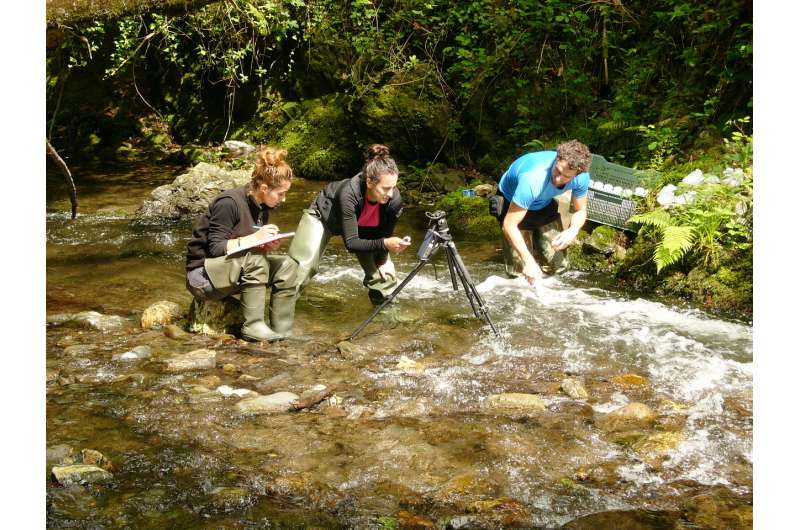Members of the UPV/EHU's Stream Ecology Group measuring the self-purification capacity of a river using an addition of nutrients. Credit: Arturo Elosegi / UPV/EHU
A study conducted by a UPV/EHU-University of the Basque Country research group proposes going beyond the exploration of river ecosystems and incorporating a set of processes that regulate not only the fluxes of matter, but also the fluxes of energy within an ecosystem. In a recently published paper, the group is proposing a new framework to study the status of rivers.
The Ecología de ríos/Stream Ecology research group specialises in the study of the way rivers function. "We synthesize and classify all the processes that can be measured in rivers; we explain how the measurements can be made (methods existing in the literature), how these processes respond to various environmental stressors, etc.," says Daniel von Schiller, one of the authors of the article. It is a "proposal that puts forward a new, highly appropriate working framework for both researchers and managers," he adds.
As the article states, "The Water Framework Directive stipulates that river ecosystems need to be assessed not only from the point of view of their structure, but also from the way they function. Thus, it is possible to obtain a better estimate of a river's ecological status." The researcher draws an analogy with the human body: "If a patient is only checked to see whether she actually has a heart, lungs and kidneys, while the heart rate, the volume of air breathed and what the kidneys filter are not measured, the health status of the patient is not being properly assessed or, as in our case, the ecological status of the ecosystem being measured."
Currently, measurements used to determine the ecological status of the rivers are structural, related to the shape of the channel, water quality or the ecological composition, measurements of communities, pollutants, temperature, concentration of nutrients, etc. But the way an ecosystem functions is defined as the set of processes that regulate both matter fluxes and energy fluxes within an ecosystem. In this respect, the researchers are proposing a raft of complementary measurements of function relating to metabolism processes, the decomposition of organic matter, nutrient cycling, pollutant dynamics and river community dynamics.
Additionally, these methods have been classified in terms of variables such as difficulty, complexity, costs, spatial and temporal scales of measurement, etc. "Finally," says Daniel von Schiller, "we have conducted an exhaustive study into the literature on the responses of the various processes to environmental stressors of anthropogenic origin (such as pollution, channelling work, acidity, etc.)."
By way of conclusion, the researcher says, "This is the first time that everything that can be measured in terms of processes in rivers has been synthesised, and we are not only presenting what can be measured, we are also presenting why, how and what advantages are offered by one process over another, in addition to how it responds to stressors." The researchers set out to produce a tool that both researchers and managers can use for their work. The team is also in contact with groups linked to water control, including URA-The Basque Water Board, to set up an innovative project to implement river measurements and functional indices.
More information: Daniel von Schiller et al, River ecosystem processes: A synthesis of approaches, criteria of use and sensitivity to environmental stressors, Science of The Total Environment (2017). DOI: 10.1016/j.scitotenv.2017.04.081
Journal information: Science of the Total Environment
Provided by University of the Basque Country























